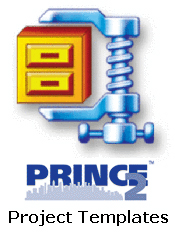If you've attended our PRINCE2® Foundation or PRINCE2 Practitioner course and want to start a project using PRINCE2 back at work, you'll need somewhere to start.
Here you can download official PRINCE2 project templates to help you to manage your project effectively.
You can download a zipped folder containing all of the PRINCE2 project templates or select individual templates from the list below:

PRINCE2 Project Templates:
- Benefits Review Plan
- Business Case
- Checkpoint Report
- Communication Management Strategy
- Configuration Item Record
- Configuration Management Strategy
- Daily Log
- End Project Report
- End Stage Report
- Exception Report
- Highlight Report
- Issue Register
- Issue Report
- Lessons Log
- Lessons Report
- Project Plan
- Product Description
- Product Status Account
- Project Brief
- Project Initiation Documentation
- Project Product Description
- Quality Management Strategy
- Quality Register
- Risk Management Strategy
- Risk Register
- Work Package
Andy Trainer
18 Nov 2009
As we always make clear on our PRINCE2® training, PRINCE2 is a toolkit. Whilst you need to learn the whole toolkit to pass your PRINCE2 Foundation or PRINCE2 Practitioner exam, when you come to run PRINCE2 projects back in the workplace, you'll use the parts of the methodology that suit your situation most, and not necessarily all of the tools on every project.
If you're building a business case for implementing PRINCE2 in your organisation, or have attended one our PRINCE2® Foundation or PRINCE2® Practitioner training and want some more information about how other organisations have implemented PRINCE2, these case studies provide useful insights in to how PRINCE2 2009 is used in the real world, and the benefits it can bring.
Click on the links below to download case studies about how the British Council and Suffolk County Council have implemented PRINCE2.


Andy Trainer
18 Nov 2009
One of the questions we're most commonly asked by delegates attending our PRINCE2® Training is "how does this apply in the real world". Whilst a good PRINCE2 Foundation or ;PRINCE2 Practitioner course should get you through your exam (which I'm pleased to say we're very successful at with a 97% pass rate), PRINCE2 is essentially a toolkit, and it's equally important to understand how you'll actually use these tools back at the office.
We achieve this by using PRINCE2 certified trainers who have extensive real-world experience as project managers who can help you to understand how the PRINCE2 processes and themes apply to real projects.
PLUS - everyone can now download free PRINCE2 Project Templates and PRINCE2 Case Studies from our Free Resources section.

Download the PRINCE2 Project Templates for a zipped folder stuffed with documents in Word and Excel format that you can use at every stage of your PRINCE2 project.
Download the PRINCE2 Case Studies for real-world insights in to how the British Council and Suffolk County Council have benefited from PRINCE2.
If you have any questions about the PRINCE2 method or are interested in attending a PRINCE2 training course, call our office on 01273 622272 or e-mail us at info@siliconbeachtraining.co.uk
Andy Trainer
18 Nov 2009
|
Here at Silicon Beach Training we offer a wide range of Management Training & Leadership Training courses, and a topic that regularly appears in a lot of them is SMART objectives. So what are SMART objectives? In this post we take a look at how you can use them effectively. |

Some of the training courses that look at SMART objectives in more detail include Management Skills for New Managers, Leadership Skills Training, Performance Management Training & Appraisals Training.
Goals, aims and objectives are often confused. All describe things that you want to achieve, however I see goals and aims as broader, more aspirational intentions whereas an objective is a narrower more defined task you need to achieve in order to meet your long term goals and aims.
All managers and leaders must be able to set effective objectives for their staff, whether they are to achieve project or task objectives, personal development objectives for people to grow in their role or performance standard objectives aligned with a competency framework, values or behavioural guidelines.
When setting objectives for your team you will need to ask yourself:
- What are my team’s targets and goals for the coming period?
- What standards do I need the team to maintain / improve?
Andy Trainer
14 Mar 2011
|
Here at Silicon Beach Training we offer a wide range of Management Training & Leadership Training courses, and a topic that regularly appears in a lot of them is SMART objectives. So what are SMART objectives? In this post we take a look at how you can use them effectively. |

Some of the training courses that look at SMART objectives in more detail include Management Skills for New Managers, Leadership Skills Training, Performance Management Training & Appraisals Training.
Goals, aims and objectives are often confused. All describe things that you want to achieve, however I see goals and aims as broader, more aspirational intentions whereas an objective is a narrower more defined task you need to achieve in order to meet your long term goals and aims.
All managers and leaders must be able to set effective objectives for their staff, whether they are to achieve project or task objectives, personal development objectives for people to grow in their role or performance standard objectives aligned with a competency framework, values or behavioural guidelines.
When setting objectives for your team you will need to ask yourself:
- What are my team’s targets and goals for the coming period?
- What standards do I need the team to maintain / improve?
Andy Trainer
14 Mar 2011
 Microsoft Project is the definitive tool for project managers. However using it in a shared environment can often lead to difficulties - particularly when you've
Microsoft Project is the definitive tool for project managers. However using it in a shared environment can often lead to difficulties - particularly when you've
lead to difficulties - particularly when you've got lots of projects thatuse the same resources.This is where resource pools can be invaluable - and they're not that hard to set up!
To learn more about Resource Pools, and plenty more besides in MS Project, why not attend one of our public 2-day MS Project Training courses here in Brighton, Sussex? For general project management skills we also run a 1-day Introduction to Project Management training course, and we are also an Accredited Training Organisation for PRINCE2 Training.
How to use Resource Pools in Microsoft Project 2010
Creating the same set of resources in each project is unnecessary duplication. You can create a resource pool, entering the resources only once and saving time and storage space. The resources reside in one file and other projects can link into this pool, thus creating project sharer files. If information is changed in the pool, all sharer files will be updated. Also when the pool is changed from a sharer file, the resource pool is updated.
Creating a Resource Pool in MS Project 2010
Follow the following simple steps to create a resource pool in Project 2010
- Create a New Project
Don't worry about the start/end date, or entering any tasks
Andy Trainer
9 Feb 2011
Performance appraisals don’t always go to plan, being prepared and able to tackle things when they don’t go as planned can make a huge difference.
9 Deadly Performance Appraisals Mistakes –Problems to avoid
1. Managers and Employees have Bad experiences of appraisals
It is important to accept that many people fear and dislike appraisal interviews; it can often be because of bad past experiences when being appraised. Employees often think of appraisals are a stick for Management to beat them with – an opportunity to give them a "telling - off" or to give out extra workload. Appraisals for many people seem threatening and unpleasant. It can seem to employees that their pay-rise and/or job security, depend on performing well in an appraisal. Employees may worry about appraisers who they feel do not like them. Many employees worry about their weaknesses being exposed or about feeling humiliated.

Many managers or HR professionals have also had bad experiences of appraising employees. They may understand it is their job to make changes in people but don’t know how. They may be worried worry about upsetting people and causing arguments. Appraisal interviews have a reputation for being bureaucratic and time consuming and that often make very little difference. Appraisals can seem like a burden and a waste of time to be completed as quickly and painlessly as possible.
2. The Benefits of appraisals aren't properly explained
People will only change if they see benefits to changing. Often appraisal systems are introduced without the benefits being made clear. As a result most people participate in appraisals because it is obligatory. They participate but see them as pointless because they cannot see the benefits for themselves.
Andy Trainer
20 Dec 2010
Performance appraisals don’t always go to plan, being prepared and able to tackle things when they don’t go as planned can make a huge difference.
9 Deadly Performance Appraisals Mistakes –Problems to avoid
1. Managers and Employees have Bad experiences of appraisals
It is important to accept that many people fear and dislike appraisal interviews; it can often be because of bad past experiences when being appraised. Employees often think of appraisals are a stick for Management to beat them with – an opportunity to give them a "telling - off" or to give out extra workload. Appraisals for many people seem threatening and unpleasant. It can seem to employees that their pay-rise and/or job security, depend on performing well in an appraisal. Employees may worry about appraisers who they feel do not like them. Many employees worry about their weaknesses being exposed or about feeling humiliated.

Many managers or HR professionals have also had bad experiences of appraising employees. They may understand it is their job to make changes in people but don’t know how. They may be worried worry about upsetting people and causing arguments. Appraisal interviews have a reputation for being bureaucratic and time consuming and that often make very little difference. Appraisals can seem like a burden and a waste of time to be completed as quickly and painlessly as possible.
2. The Benefits of appraisals aren't properly explained
People will only change if they see benefits to changing. Often appraisal systems are introduced without the benefits being made clear. As a result most people participate in appraisals because it is obligatory. They participate but see them as pointless because they cannot see the benefits for themselves.
Andy Trainer
20 Dec 2010